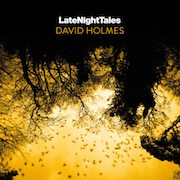Few individuals fit the mould for a much-loved, artist-curated compilation series quite as comfortably as David Holmes. From his globetrotting, hugely influential DJ career to his genre-hopping solo output via soundtrack work for the likes of Steven Soderbergh and Steve McQueen, the Belfast polymath has the quintessential markings of a Late Night Tales curator. Doubling up as a feature-length breather of sorts following two decades of activity and crate-digging, Holmes’ addition to the series is a quiet triumph of meditative poise and restraint, underscoring his reputation as a savant whose appetite for curio, collaboration and the deepest of cuts continues to hold him in good stead.
Not merely limited to his twenty film soundtracks to date, Holmes’ affinity for cinema has always felt indivisible from that exhaustive interest in music that betrays an inherently visual quality. But without a backdrop to soundtrack here, these nineteen “mind-movies” – ranging from personal favourites, several exclusive tracks and a host of anomalous gems – thread a somnambulist tapestry that is masterfully narrative-like in its elevation and flow. With opener, Barry Woolnough’s almost threatening ‘Great Father Spirit In The Sky’, emerging from a cloud of balmy ambience, the veil is slowly pulled back by way of its invocation and tribal groove. Rather than embarking on what he calls a “very personal journey” with a siren of sound, Holmes’ feature-length late night tale unravels in precisely the manner that it means to go on.
Whilst the sway of love and afterglow of memory are themes recurrently touched upon throughout, death, the afterlife and salvation that are at the well-worn heart of Holmes’ contribution to the long-running series. Take ‘The Reiki Healer From County Down’, a slow-burning collaboration between Holmes and Bangor friend Steve Jones, the somewhat sinister yet perfectly uncanny ‘It’s A Long Way To Heaven’ by The Children of Sunshine and Alain Maclean’s ‘Talking Judgement Day Blues’; weaving in and out of each other by way of various ambient segues, such as gently crashing waves or the sad sound of a car passing on an empty road, these are hushed yet clear-cut ruminations on this mortal coil, what lies beyond and what it takes to get there. In essentially soundtracking the duskier thoughts that keep the best of us up at night, Holmes crafts a linear narrative that posits inner elevation and personal deliverance at the root of it all.
With the likes of Buddy Holly’s ‘Love Is Strange’ and David Crosby’s ‘Orleans’ sat back-to-back with a slew of rarities, slight blips of incongruence might have been inevitable were Holmes not so well versed in tracing correlations in the most disparate of sounds. And interspersed with nine exclusive efforts here – many featuring some less established but no less exceptional friends and artists at home – the release shines with a real sense of collaborative intimacy. Where Monaghan identical sister duo Song Sung’s re-imagining of 10cc’s ‘I’m Not In Love’ proves a wonderfully spectral peak, Belfast drone pop seven-piece Documenta’s Holmes-produced ‘Love As A Ghost’ and enigmatic Belfast artist De Lucille Campbell AKA Die Hexen’s ‘Gloomy Sunday’ prove positively inspired. But it’s Holmes’ cut with inimitable 70-year-old Dubliner BP Fallon that seals the deal. An impassioned spoken word tribute to the late, great Henry McCullough, it’s a simple yet profoundly personal piece in which the borderline mystical tone that defines Holmes’ release gleams into sharp focus over five minutes.
Rather than simply invite one to slumber, David Holmes impels the listener to cut themselves some metaphysical slack on his Late Night Tales. Conjuring both a sense of Nietzschean Eternal Return and the aboriginal concept of Dreamtime, this is music to be listened to on a solitary stroll just as the evening starts to bleed into the night. It’s music to submit to on good headphones whilst quietly rejoicing in the ever impenetrable, fucked-up madness of it all. It’s music to seek out when some respite from all the blurred lines in this very busy world is desperately sought. In taking our hand but never gripping too tight, Holmes taps into something that even the best Late Night Tales compilations sometimes neglect: the pure self-therapy of total escapism.


